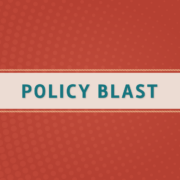NCUIH Submits Comment on Consistent Application of the Indian Child Welfare Act
On September 7, the National Council of Urban Indian Health(NCUIH) submitted written comments to the Bureau of Indian Affairs (BIA) and the Administration for Children and Families (ACF) on the BIA and ACF’s efforts to promote the consistent application of the Indian Child Welfare Act (ICWA) and protect children, families, and Tribes.
In the submitted comments, NCUIH made the following specific comments, requests, and recommendations to ACF and BIA in response to the July 8, 2022 correspondence:
- Ensure that urban child welfare and judicial systems are aware of and able to implement ICWA appropriately
- According to the National Indian Child Welfare Association (NICWA), American Indian/Alaska Native(AI/AN) children continue to be overrepresented in the state foster care system at a rate 7 times higher than their non-Native peers. Because more than 70% of AI/AN people live in urban settings, this overrepresentation undoubtedly includes AI/AN children living in urban areas.
- To properly implement ICWA, state courts must determine whether a child is an “Indian Child” for the purposes of ICWA as a threshold determination in the proceedings. There are states with experience in the application of ICWA and making applicability determinations. However, some state courts and child protective agencies may not be aware of this requirement or may make incorrect assumptions about a child’s “Indian child” status based on physical appearance or distance from their Tribe. This process needs to be standardized across all states to ensure the safety of these children
- An AI/AN child’s physical location should not affect whether they receive ICWA’s protections. Specifically, NCUIH requests that ACF and BIA provide technical assistance on ICWA to state social service and child welfare agencies and courts located in urban areas.
- Actively inform urban child welfare and judicial systems about urban Indian organizations (UIOs) as a potential resource for ICWA proceedings
- NCUIH recommended that, as part of their efforts to strengthen and implement ICWA, ACF and BIA actively inform state child welfare and judicial systems located in urban areas about UIOs as a potential ICWA resource.
- While UIOs are healthcare organizations, they often provide culturally competent services that state child welfare services and courts can refer parents to in accordance with ICWA’s “active efforts” requirements. For example, various UIOs provide the following services: family support services, parenting classes and groups, gender-based violence programs, and breastfeeding support.
- Because UIOs are AI/AN organizations, they may be able to provide useful contacts or other information when a state child welfare agency throughout the child welfare process, including during the initial “Indian child” determination phase.
- The UIO connection may be particularly useful in areas, such as Chicago, where there is an active UIO but no federally recognized Tribes nearby, and urban systems may not know where to start with the ICWA process.
Background
Congress enacted ICWA in 1978 to re-establish tribal authority over the adoption of Native American children (25 U.S.C. § 1903.) The goal of the Act was to strengthen and preserve Native American family structure and culture. Studies conducted in advance of ICWA’s drafting showed that between 25% and 35% of all Native children were being removed from their home by state child welfare and private adoption agencies. Of those, 85% were placed with non-Native families, even when fit and willing relatives were available. ICWA was established as a safeguard that requires:
- Recognition of Tribal jurisdiction over decisions for their Indian children;
- Establishment of minimum Federal standards for the removal of Indian children from their families;
- Establishment of preferences for placement of Indian children with extended family or other Tribal families; and
- Institution of protections to ensure that birth parents’ voluntary relinquishments of their children are truly voluntary.
According to NICWA, ICWA “[l]essens the trauma of removal by promoting placement with family and community . . . [p]romotes the best interest of Indian children by keeping them connected to their culture, extended family, and community, which are proven protective factors . . . [and] [p]romotes placement stability by ensuring that voluntary adoptions are truly voluntary.”
Next Steps
NCUIH will continue to advocate for the appropriate application of ICWA to all welfare proceedings involving AI/AN children, regardless of whether the child is located in an urban or rural community.








Leave a Reply
Want to join the discussion?Feel free to contribute!